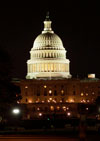
With less than a year left to implement the Comprehensive Peace Agreement that ended more than two decades of war between Sudan’s North and South, U.S. senators this week expressed their concern about all that’s left to work out – more than five years in to the peace agreement’s six-and-a half year interim period.
With the backing of 13 other co-sponsors, Senator Russ Feingold (D-WI) introduced Senate Resolution 440, which calls for the full implementation of the Comprehensive Peace Agreement and other efforts to promote peace and stability at this critical moment in Sudan’s history. The resolution notes that although some progress has been made by the Sudan’s ruling parties to implement the landmark 2005 peace deal, “limited national government reforms have been made and several key issues remain outstanding.” The senators also noted with concern recent reports that both the North and South are building up their security forces and covert weapons stockpiles in anticipation of a possible return to war.
This week’s action by the senators should serve as a powerful message to President Obama to lead reinvigorated and strengthened international engagement on CPA implementation. At present, U.S. diplomatic presence on the ground in Sudan is minimal. The Obama administration needs to deploy additional diplomatic resources to Sudan in order to signal its commitment to helping the parties prevent further conflict. A higher level of engagement will also enable the administration to better communicate its intent to deploy additional pressures on the National Congress Party in Khartoum and the Sudan People’s Liberation Movement in the South if progress toward lasting peace and stability in the country is not made.
This commitment to fully implementing the CPA is all the more important given the recent background comments by a senior administration official which seem to be an effort to dramatically lower the bar for the April national elections in Sudan. It is truly unfortunate that this official, who lacked the fortitude to place his comments on the record, seems to ignore the lack of a free media, the continued presence of draconian detention laws, the failure to reform Sudan’s security services, the lack of right to public assembly, and a badly flawed registration process in this preemptive effort to bless an election everyone knows will be neither free nor fair.
The Senate resolution addressed the need to strategize and prepare for “all eventualities” following the January 2011 self-determination referendum for southern Sudan, including planning for longer-term development in the region following the referendum. This call-to-action from the halls of the U.S. Capitol signals that many senators appreciate the enormous hurdles that lay ahead in Sudan in the coming year.
There are mere months left for governments to prepare their initial and longer-term support for the South, regardless of the outcome of its looming referendum. Coordination of this assistance is crucial in order to address the significant challenges the South will face in 2011 and beyond, from reforming the South’s security sector and improving the government’s ability to deliver services to its largely rural and impoverished population. Speaking as just one member of the wider advocacy community, the sense of urgency conveyed by this Senate resolution is appreciated.

